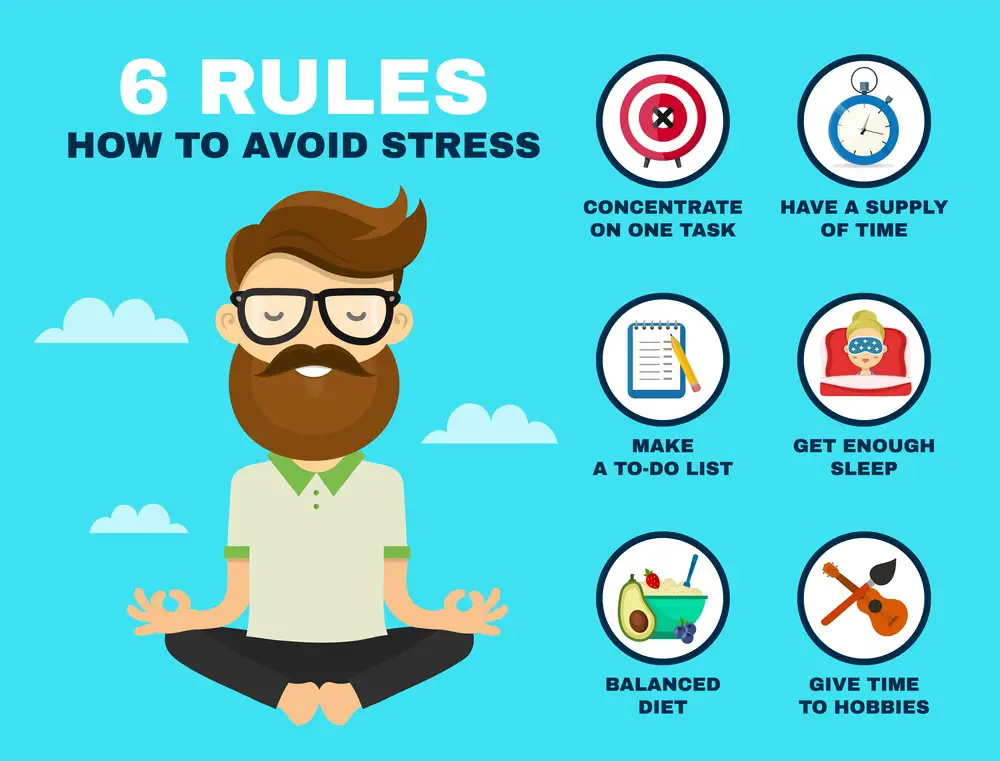As a BetterHelp affiliate, we receive compensation from BetterHelp if you purchase products or services through the links provided
Have you ever felt your stomach puff up like a balloon after a stressful day? It’s not all in your head; stress can lead to bloating and other tummy troubles. In this blog, we’ll dive into why stress ties into digestive discomfort and share tips to smooth things out.
Keep reading to deflate the bloat!
Understanding the Link: Stress and Bloating
 When discussing stress wreaking havoc on our bodies, we often overlook how it can directly inflate our digestive discomfort; let’s delve into the crucial connection between a frazzled state of mind and that frustrating bloating feeling.
When discussing stress wreaking havoc on our bodies, we often overlook how it can directly inflate our digestive discomfort; let’s delve into the crucial connection between a frazzled state of mind and that frustrating bloating feeling.
Can Stress Cause Bloating and Other Digestive Symptoms?
Stress can lead to a puffed-up feeling in your stomach and other unpleasant digestive symptoms. When you’re under the gun, your body pumps out stress hormones that trigger inflammation and alter the balance of good bacteria in your gut.
This imbalance can manifest as bloating, gas, and discomfort – signs your digestive system is unhappy. Imagine your insides are like a busy highway; stress acts like a roadblock, causing traffic jams that slow down digestion in some people while speeding it up in others.
Bloating isn’t alone on the list of tummy troubles linked to stress. Your stomach might also cramp up or feel achy due to anxiety-induced tension. Moreover, over-breathing when stressed may cause you to swallow too much air—another direct ticket to Bloatedville.
For those who already live with sensitive guts or conditions like irritable bowel syndrome (IBS), emotional turmoil can be incredibly disruptive, worsening abdominal pain and bloating substantially.
Understanding the “Fight or Flight” Response
Your body’s “Fight or Flight” response is a natural reaction to perceived threats. It may save you from danger, but it can also lead to stress-related bloating and gastrointestinal problems.
When faced with stress, your body pumps out adrenaline and cortisol, which prepare you for quick action. These hormones speed up your heart rate, send blood to essential muscles, and can disrupt the balance of your gut microbiome. This survival mechanism has side effects that impact digestion.
Digestive processes slow down or stop so energy can be redirected to vital organs needed for immediate response. This slowdown can cause uncomfortable bloating and create an environment where stomach pain flourishes due to increased inflammation.
As this process unfolds repetitively over time under chronic stress conditions, it can contribute significantly to long-term digestive issues such as IBS symptoms.
How Stress Affects the Gut Microbiome?
Stress can wreak havoc on the gut microbiome, that complex community of bacteria living in our digestive tracts. Think of it as a bustling city inside your belly, where the residents—those tiny microbes—play a crucial role in digestion, immunity, and overall health.
But when stress kicks in, it’s like a storm hitting that city. The body’s fight-or-flight response shifts into high gear, releasing hormones that alter gut function. These changes can disrupt the delicate balance of good and bad bacteria.
Inflammatory chemicals increase under stress, which can directly affect these microbial populations. Some beneficial bacteria might pack up and leave, while harmful ones might multiply too quickly.
This imbalance often leads to bloating and discomfort and other gastrointestinal symptoms such as cramping or diarrhea. Over time, chronic stress can keep this once-thriving microbial metropolis from functioning correctly – leading to ongoing stomach problems and a more sensitive gut.
The Science Behind Stress-Induced Bloating
Your body reacts to stress with changes designed to prepare you for a perceived threat. This is known as the “Fight or Flight” response. During this reaction, your body directs blood away from your stomach and toward your muscles, preparing for quick action.
As part of this process, digestion can slow down significantly or even halt because it’s not considered essential in the moment of danger. This slowdown can lead directly to that uncomfortable feeling: bloating.
The impact on gut health goes deeper with chronic stress leading to inflammation and an imbalance in gut bacteria – critical factors in maintaining healthy digestion.
These physiological shifts are powerful enough to trigger symptoms of Irritable Bowel Syndrome (IBS), including significant bloating and pain.
Moreover, rapid breathing or hyperventilation that often accompanies anxiety introduces extra air into your digestive system; this excess air builds up, causing even more bloating and discomfort.
Coping Strategies for Stress-Related Bloating
It’s common to notice bloating gets worse when you’re stressed. While eliminating stress may not be possible, using research-backed coping strategies can help you feel—and look—better when things get tense.
Tune Into Your Eating Patterns
Stress disrupts signals between the brain and digestive system, triggering inflammation, constipation, and indigestion. Minimize intake of common GI irritants like fatty foods, dairy products, beans, carbonation, artificial sweeteners, and sugar alcohols.
Incorporate more soluble fiber into your diet, which can be found in foods like oats, apples, and chia seeds, to aid digestion and reduce stress-induced bloating.
Avoiding rushed meals and eating in a calm environment can also significantly improve how your body processes food. Mindful eating practices, such as paying attention to your food’s taste, texture, and smell, encourage a more relaxed eating experience and enhance digestive efficiency.
Slow down, chew thoroughly, and opt for small, frequent meals full of digestive aids like fermented foods, greens, and anti-inflammatory spices. Staying hydrated with water and herbal teas is also vital for healthy digestion.
Make Time for Daily Movement
Just 10 minutes of walking after eating supports the digestive processes. Plus, exercise releases endorphins and promotes blood flow to relieve that sluggish feeling. Yoga is another excellent option, with twisting poses that gently stimulate and massage the abdomen.
Go for brisk walks, follow YouTube yoga routines, or try rhythmic exercises like dance cardio that you enjoy.
In addition to aerobic exercises, strength training can also play a critical role in managing stress and improving digestive health.
Regular, moderate-intensity strength training helps maintain muscle mass, supporting metabolism and digestion. Activities such as pilates and bodyweight exercises strengthen the core, which can help reduce bloating and improve posture during and after meals.
Experiment with Stress-relieving Practices
Breathwork, meditation, Epsom salt baths, and calming essential oils are just some examples. Let these become daily rituals. Reducing overall stress levels helps break the cycle of cortisol and inflammation that exacerbate digestive woes. The more you prioritize self-care, the less often you’ll notice bloating.
Incorporating nature into your stress management routine can have profound benefits.
Spending time in green spaces, such as parks or gardens, or even caring for houseplants, can lower stress levels and improve mood. Nature’s calming effect helps regulate the body’s stress response, which can mitigate stress-related bloating.
Also, engaging in creative activities such as painting, writing, or playing music can be therapeutic outlets for stress, fostering a sense of accomplishment and relaxation.
Give Your Gut Extra Love
Probiotic and fiber supplements, which have been shown to ease digestive issues, are great gifts to your body. These support healthy bacteria for reduced inflammation and constipation daily and when stressed.
It’s also advisable to know specific bloating triggers that may need evaluation if severe or persistent, so check with your doctor. But otherwise, be patient with yourself on stressful days—and rely on these coping strategies.
Understanding the impact of stress on gut health can empower you to take proactive steps toward maintaining digestive balance.
Emphasizing a diet rich in whole foods, lean proteins, and plenty of vegetables can support gut health and mitigate the effects of stress on the digestive system. Integrating prebiotic-rich foods such as garlic, onions, and bananas can further nourish the beneficial bacteria in your gut, enhancing your body’s resilience to stress-induced digestive issues.
Lifestyle Changes to Alleviate Stress and Bloating
 Lifestyle modifications can serve as powerful tools in our quest to manage stress and minimize bloating. These changes aim to reduce stress levels and improve our digestive health, creating a more balanced and harmonious body system.
Lifestyle modifications can serve as powerful tools in our quest to manage stress and minimize bloating. These changes aim to reduce stress levels and improve our digestive health, creating a more balanced and harmonious body system.
Prioritize Regular Sleep Patterns
Adequate sleep is crucial for regulating stress hormones and maintaining gut health. Aim for 7-9 hours of quality sleep per night to help your body recover from daily stressors.
Incorporating relaxation techniques such as deep breathing exercises, meditation, or gentle yoga before bedtime can further promote relaxation and improve sleep quality. Winding down activities like reading or calming music can enhance sleep quality. Avoiding screens and heavy meals before bedtime also helps set the stage for a restful night.
These practices help calm the mind, reduce stress, and prepare the body for a night of deep, restorative sleep.
Cultivate a Support Network
Social support plays a vital role in stress management. Connecting with friends, family, or support groups can provide emotional comfort and reduce feelings of isolation. Sharing experiences and coping strategies with others can offer new perspectives and solutions to manage stress effectively.
Additionally, leveraging technology for virtual meet-ups or joining online forums related to stress management can expand your support network beyond geographical limits. These platforms offer the opportunity to connect with a broader community facing similar challenges, enriching your support system with diverse insights and encouragement.
Develop a Hobby
Engaging in activities you enjoy can be a wonderful escape from stress. Whether gardening, painting, hiking, or playing a musical instrument, hobbies can provide a sense of achievement and joy. They distract from daily worries, fostering a state of flow where time seems to stand still and stress fades away.
Regularly dedicating time to these activities can also contribute to personal growth and self-esteem, reinforcing a positive mindset and resilience against stress. Hobbies encourage mindfulness, a practice of being present at the moment, which is known to reduce stress levels and improve overall mental health.
Physical Therapy
Physical therapists can teach you exercises that specifically target the abdominal region, helping to strengthen the core muscles and improve gastrointestinal function. Routine stretches and movements prescribed by a therapist reduce stress and enhance circulation to the gut area, promoting better digestion and reducing symptoms of bloating.
Regular physical therapy sessions may also relieve secondary symptoms associated with digestive disorders, such as back pain or muscle tension.
This holistic approach addresses both the mental and physical aspects of stress-induced gastrointestinal problems, offering a practical pathway toward long-term relief for those struggling with sensitive guts influenced by anxiety or chronic stress.
Natural Remedies for Stress-Induced Bloating
 Alongside lifestyle adjustments, specific natural remedies can offer relief from stress-induced bloating. These remedies focus on soothing the digestive system and promoting a calm, relaxed mind.
Alongside lifestyle adjustments, specific natural remedies can offer relief from stress-induced bloating. These remedies focus on soothing the digestive system and promoting a calm, relaxed mind.
Herbal Teas
Herbal teas like peppermint, ginger, and chamomile are known for their digestive and calming properties. Peppermint relaxes the muscles of the GI tract, ginger reduces inflammation, and chamomile alleviates stress. Sipping these teas throughout the day can ease bloating and calm the nerves.
Incorporating these herbal teas into your daily routine not only assists in managing bloating but also supports overall digestive health. For instance, dandelion tea, another beneficial brew, acts as a diuretic, helping to reduce water retention and further alleviate bloating.
Regular consumption of these teas can significantly improve digestive function and stress management.
Aromatherapy
 The use of essential oils through aromatherapy can have a positive effect on stress levels and digestion. Lavender, for instance, is widely recognized for its ability to reduce stress and promote relaxation. Diffusing essential oils or applying them topically (with a carrier oil) can help soothe the mind and, indirectly, the gut.
The use of essential oils through aromatherapy can have a positive effect on stress levels and digestion. Lavender, for instance, is widely recognized for its ability to reduce stress and promote relaxation. Diffusing essential oils or applying them topically (with a carrier oil) can help soothe the mind and, indirectly, the gut.
Moreover, experimenting with blends of essential oils, such as peppermint, lemon, ginger, and lavender, can enhance stress-relieving and digestive benefits. These combinations can be tailored to personal preferences and specific needs, offering a versatile approach to addressing stress-induced bloating and promoting well-being.
Acupressure and Massage
Acupressure and gentle abdominal massage can stimulate the digestive system and relieve bloating. Using circular motions on the abdomen or pressing specific acupressure points can help release trapped gas and improve bowel movements. These practices also encourage relaxation, reducing the overall impact of stress on the body.
Beyond acupressure and massage, incorporating regular physical activity, such as walking or yoga, can further stimulate digestion and stress relief. Movement helps regulate the digestive system and can be particularly effective when combined with these targeted techniques, offering a holistic approach to managing bloating.
Mind-Body Techniques
 Practices such as tai chi, qigong, and guided imagery focus on the connection between mind and body. They help in reducing stress and improving physical symptoms, including digestive issues. These techniques can alleviate bloating and enhance well-being by fostering mindfulness and relaxation.
Practices such as tai chi, qigong, and guided imagery focus on the connection between mind and body. They help in reducing stress and improving physical symptoms, including digestive issues. These techniques can alleviate bloating and enhance well-being by fostering mindfulness and relaxation.
Expanding on these practices, integrating deep breathing exercises and progressive muscle relaxation can further combat stress and its effects on the digestive system. These methods enhance the body’s relaxation response, effectively managing stress-induced symptoms and improving overall digestive health.
Remember, consistency is critical. Over time, these practices can help you manage stress more effectively and keep bloating at bay. Always consult a healthcare professional before starting any new health regimen, especially if you have existing health conditions or concerns.
Stress Management Techniques for a Bloat-Free Life
Living a bloat-free life starts with managing stress effectively. Implementing stress management techniques can significantly improve gut health and reduce digestive problems. Here are several strategies to keep stress and bloating at bay:
- Practice deep breathing exercises: Slow, deep breaths can calm the nervous system and reduce the “Fight or Flight” response that affects gut health. This helps prevent hyperventilation, often leading to digestive issues like gas and bloating.
- Engage in regular physical activity: Exercise promotes better digestion by reducing anxiety and improving blood flow to your digestive tract. It also aids in releasing endorphins, which elevate mood and alleviate emotional stress.
- Establish a consistent relaxation routine: Whether it’s yoga, meditation, or reading, make time daily for activities that relax your mind. A relaxed state counters gastrointestinal distress caused by environmental or psychological stress.
- Get adequate sleep each night: Proper rest keeps the body’s systems, including the digestive system, functioning optimally. Lack of sleep can worsen stress-related stomach pain and bloating.
- Connect with friends and family: Social support is crucial for emotional well-being. Spending time with loved ones can help manage mood disorders and reduce feelings of anxiety that contribute to gastrointestinal issues.
- Learn cognitive-behavioral techniques: Therapy methods such as CBT can equip you with skills to change negative thought patterns that may be triggering anxiety-related gas and bloating.
Optimize your diet: Eating balanced meals at regular intervals supports gut health. Limit foods that trigger bloating and focus on those rich in fiber, which promotes a healthy gut microbiome.
Navigating Towards Relief: When to Seek Professional Help for Stress-Induced Bloating
 As we journey through understanding the intricate dance between stress and bloating, we must recognize the signs that indicate the need for professional intervention. Identifying when stress-induced bloating requires more than just home remedies or lifestyle adjustments is pivotal to achieving lasting relief and well-being. This section aims to guide you through recognizing those signs, deciding between therapy or medication, setting clear treatment goals, and acknowledging progress along your path to recovery.
As we journey through understanding the intricate dance between stress and bloating, we must recognize the signs that indicate the need for professional intervention. Identifying when stress-induced bloating requires more than just home remedies or lifestyle adjustments is pivotal to achieving lasting relief and well-being. This section aims to guide you through recognizing those signs, deciding between therapy or medication, setting clear treatment goals, and acknowledging progress along your path to recovery.
Recognizing the Signs: When Professional Help is Needed
While stress-related bloating can often be managed with the coping strategies, lifestyle changes, and natural remedies discussed earlier, there are times when these measures might not suffice. Here are signs that it’s time to consider professional help:
- Persistent Symptoms: If bloating and stress persist despite trying various self-help strategies.
- Impact on Daily Life: Symptoms severely impact your daily activities, work, or relationships.
- Emotional Distress: Increased anxiety, depression, or other emotional issues arising alongside bloating.
- Physical Health Concerns: If you suspect your bloating is a symptom of a more serious underlying health condition.
Therapy vs. Medication: Making the Right Choice
Deciding between therapy and medication—or a combination of both—depends on the severity of your symptoms and their underlying causes. Here’s a brief overview to help you make an informed decision:
- Therapy: Ideal for those seeking to understand and manage the root causes of stress. CBT and other forms of counseling offer effective strategies for stress management and coping..
- Medication: This may be necessary for those experiencing severe stress or anxiety symptoms that therapy alone cannot alleviate. Medications can relieve symptoms, allowing other strategies to be more effective.
Setting Goals for Treatment: The Path to Progress
Having clear goals for treatment can significantly enhance your journey towards relief from stress-induced bloating. These goals may include:
- Reducing Stress Levels: Implementing stress management techniques to achieve a calmer mind.
- Alleviating Bloating: Through dietary changes, medication, or therapy, depending on the cause.
- Improving Overall Well-being: Enhancing your quality of life through better stress and health management.
Recognizing Progress: Signs You’re on the Right Path
Acknowledging progress is essential for motivation and continued improvement. Signs that you’re moving in the right direction include:
- Decreased Frequency and Severity of Bloating: Noticing a reduction in bloating episodes and their impact.
- Improved Stress Management: Feeling more equipped to handle stressors without becoming overwhelmed.
- Enhanced Quality of Life: Experiencing better overall health, mood, and daily functioning.
While stress-induced bloating can be challenging, understanding when and how to seek professional help can make all the difference. You can effectively manage stress and bloating by recognizing the signs that more specialized intervention is needed, making informed decisions between therapy and medication, setting realistic goals, and acknowledging every step of progress. Remember, seeking help is a sign of strength and the first step towards reclaiming your health and well-being.
Conclusion
The intricate link between stress and bloating underscores the importance of managing stress for optimal digestive health. Understanding how stress affects the gut and implementing strategies to mitigate its impact can alleviate bloating and improve our overall well-being.
Incorporating mindful eating, regular physical activity, stress-relieving practices, and supportive dietary habits are critical steps toward a bloat-free life. Additionally, exploring natural remedies and establishing a consistent relaxation routine can enhance gut health.
Remember, addressing stress and its effects on digestion is a holistic journey—patience, consistency, and self-care are essential to success.
- Stress Management: What is the Relationship Between Stress and Addiction? - June 28, 2024
- Exploring Techniques to Maintain a Healthy Lifestyle without Drugs - May 28, 2024
- How Acupuncture Helps Treat Chronic Fatigue Syndrome - May 28, 2024
This site contains affiliate links to products. We will receive a commission for purchases made through these links.




